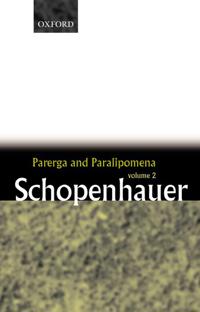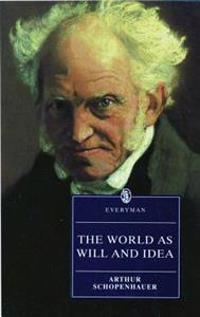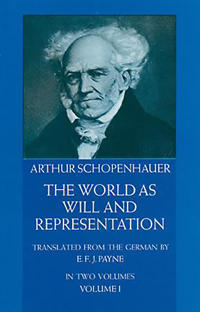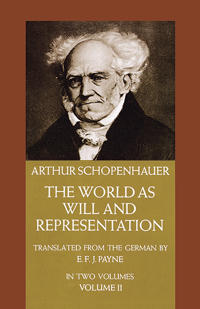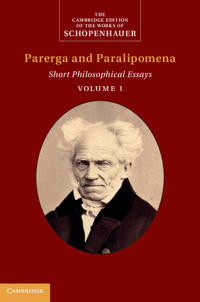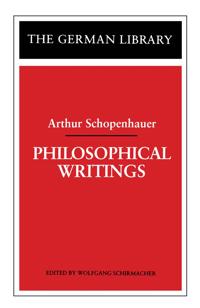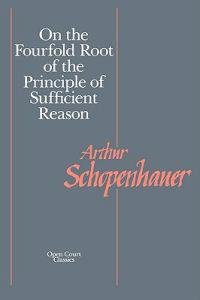Parerga and Paralipomena (Häftad)
avArthur Schopenhauer
ISBN: 9780199242214 - UTGIVEN: 2000-11Volume 2
English translation of one of the most significant and fascinating works of the great philosopher Arthur Schopenhauer (1788-1860). The Parerga (Volume 1) are six long essays; the Paralipomena (Volume 2) shorter writings, arranged under 31 subject headings.[...]The Two Fundamental Problems of Ethics (Häftad)
avArthur Schopenhauer
ISBN: 9780199297221 - UTGIVEN: 2010-05'my philosophy is like Thebes with a hundred gates: one can enter from all sides and through each gate arrive at the direct path to the centre' Schopenhauer's two essays On the Freedom of the Will and On the Basis of Morals form his complete system of ethics. Their doctrines, continuous with those [...]
Arthur Schopenhauer
ISBN: 9780321355782 - UTGIVEN: 2007-04Part of the "Longman Library of Primary Sources in Philosophy," this first volume of Schopenhauer's The World as Will and Presentation is framed by a pedagogical structure designed to make this important work of philosophy more accessible and meaningful for undergraduates.[...]
Arthur Schopenhauer
ISBN: 9780321355805 - UTGIVEN: 2010-06Part of the "Pearson Primary Sources in Philosophy," this second volume of Schopenhauer's World as Will and Presentation is framed by a pedagogical structure designed to make this important work of philosophy more accessible and meaningful for undergraduates. Each book in the Pearson Library offers [...]
The World as Will and Idea (Storpocket)
avArthur Schopenhauer
ISBN: 9780460875059 - UTGIVEN: 199506"The World as Will and Idea" (1819) holds that all nature, including man, is the expression of an insatiable will to life; that the truest understanding of the world comes through art, and the only lasting good through ascetic renunciation. Unique in western philosophy for his affinity with Eastern [...]
The World as Will and Representation (Häftad)
avArthur Schopenhauer
ISBN: 9780486217611 - UTGIVEN: 196707The World as Will and Representation (Häftad)
avArthur Schopenhauer
ISBN: 9780486217628 - UTGIVEN: 196707Arthur Schopenhauer
ISBN: 9780521870344 - UTGIVEN: 2018-05The purpose of the Cambridge Edition of the Works of Schopenhauer is to offer translations of the best modern German editions of Schopenhauer's work in a uniform format for Schopenhauer scholars, together with philosophical introductions and full editorial apparatus. The World as Will and Representa[...]
Arthur Schopenhauer: Parerga and Paralipomena
ISBN: 9780521871389 - UTGIVEN: 2014-04With the publication of the Parerga and Paralipomena in 1851, there finally came some measure of the fame that Schopenhauer thought was his due. Described by Schopenhauer himself as 'incomparably more popular than everything up till now', the Parerga is a miscellany of essays addressing themes that [...]
Philosophical Writings (Häftad)
avArthur Schopenhauer
ISBN: 9780826407290 - UTGIVEN: 199712Arthur Schopenhauer (1788-1860) is to this day the most widely read philosopher in Germany. As the composer Richard Wagner also noted, with Schopenhauer one may finally give voice to the secretly held belief that the world is essentially bad. This blunt honesty is Schopenhauer's trademark. Perhaps n[...]
On Vision and Colors by Arthur Schopenhauer
ISBN: 9780854969883 - UTGIVEN: 1994-06This is the first English translation of Schopenhauer's important work which originally appeared in 1816 in Germany. As Professor Cartwright argues in his introduction, the book's philosophical value is to be found in the means it provides for increasing our understanding of Schopenhauer's philosoph[...]
On the Fourfold Root of the Principles of Sufficient Reason (Häftad)
avArthur Schopenhauer
ISBN: 9780875482019 - UTGIVEN: 199805Reprints Schopenhauer's nineteenth-century philosophical treatise on the nature of causation in the physical world.[...]
Arthur Schopenhauer: The World as Will and Presentation
ISBN: 9781315507880 - UTGIVEN: 2016-05Part of the "e;Longman Library of Primary Sources in Philosophy,"e; this first volume of Schopenhauer's The World as Will and Presentation is framed by a pedagogical structure designed to make this important work of philosophy more accessible and meaningful for undergraduates.[...]
The Essays of Arthur Schopenhauer; The Art of Controversy (häftad)
ISBN: 9781406800425 - UTGIVEN: 2006-06The Art of Literature and The Art of Controversy (Häftad)
avArthur Schopenhauer
ISBN: 9781420931112 - UTGIVEN: 2008-01The Wisdom of Life and Counsels and Maxims (Häftad)
avArthur Schopenhauer
ISBN: 9781420931129 - UTGIVEN: 200801The World as Will and Representation (the World as Will and Idea), Volume I of III (Häftad)
avArthur Schopenhauer
ISBN: 9781420946529 - UTGIVEN: 201201The World as Will and Representation (the World as Will and Idea), Volume II of III (Häftad)
avArthur Schopenhauer
ISBN: 9781420946536 - UTGIVEN: 2012-01The World as Will and Representation (the World as Will and Idea), Volume III of III (Häftad)
avArthur Schopenhauer
ISBN: 9781420946543 - UTGIVEN: 2012-01The Essays of Arthur Schopenhauer Studies in Pessimism (Häftad)
ISBN: 9781438511863 - UTGIVEN: 2009-02The Wisdom of Life and Counsels and Maxims (Häftad)
avArthur Schopenhauer
ISBN: 9781450575867 - UTGIVEN: 201002

